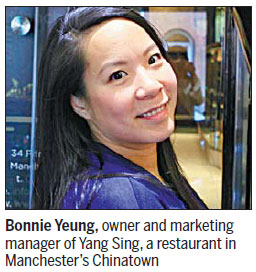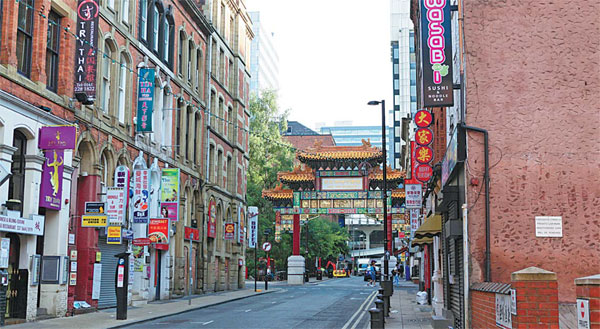Northern city throws its doors open

| Manchester's Chinatown has many innovative Chinese restaurants of various regional cuisines. Photos by Cecily Liu / China Daily |
Manchester's Chinese presence consists of a lot more than just chopsticks and noodles
Chinese migrants to Manchester are increasingly gaining recognition and becoming an integral part of the city's identity, especially as China's growing global influence is attracting increasing interest in Chinese culture overseas.
There has been great growth in the number of innovative Chinese restaurants of various regional cuisines in Manchester's Chinatown over the years, and on the there are many Chinese faces, including those of locals, students and tourists.
To celebrate Chinese New Year this year, lanterns were hung on the streets of the CBD.
The decoration was a joint effort of Heart of Manchester Business Improvement District, the organization that represents many high-end retailers in central Manchester, and the Federation of Chinese Associations of Manchester.
"We wanted to do this project because we think Chinese culture is an integral part of Manchester, and we want to celebrate it," says Simon Binns, manager of BID.
Manchester's first Chinese restaurant, Ping Hong, opened in Mosley Street in 1948. Chinese migrants first came to the city in large numbers in the 1950s and 1960s because severe labor shortages in Britain after World War II made immigration easier.
Many of the initial migrants came from Hong Kong, whose rapid urban sprawl was destroying many farmers' and traditional residents' homes.

Many of the Chinese immigrants initially worked in catering, laundries, Chinese medicine shops and Chinese supermarkets. This has allowed Manchester to grow into a Chinese-friendly place and in turn attracted a growing Chinese community.
The establishment of the Federation of Chinese Associations of Manchester has meant that any concerns from the local residents can be effectively communicated to the local government, says its president, Stewart Yip.
"There are many local government decisions that affect our member businesses, like significant road work or construction work. We have to communicate the details to our members and make sure they have a say in these community issues."
Today's Chinese community has a lot more support than the first waves of migrants, and this change is perhaps reflected in the changes in the Wai Yin Society, a community center that supports local residents.
Sylvia Sham, the society's CEO, says her team has grown from a few staff members when she joined in 1998 to 40 staff members today.
What originally began as a center to support Chinese women has expanded to support all kinds of people within the Chinese community as well as other ethnic communities in Manchester.
The society, founded in 1988, was initially set up to help Chinese women handle issues such as family violence and language barriers and encourage them to integrate more with local society. But it eventually broadened its focus, realizing that changing family dynamics would involve a lot more than helping the women.
"As women have their father, sons, brothers, and other members of the family, the Wai Yin Society decided to open its doors to the whole family," Sham says.
The center's mission has also increased from purely social services and language training to include many more activities, events and educational courses.
One of its venues is a dedicated senior care home, where elderly Chinese people visit to eat and take part in social activities. Sometimes they go out for lunch or other activities, and the premises are then used to host activities for people from other ethnic backgrounds.
The center's success would not have been possible without dedication from Sham, who arrived in Britain in 1987, initially to study for a diploma in childcare, and who continued her studies to eventually obtain a doctorate degree in education.
Sham then became a university lecturer, but upon seeing an advertisement for the Wai Yin Society, Sham gave up her full-time lecturer job to join. "I wanted to use what I have learned and do something for the community," Sham says.
Initially Sham's boss allowed her to work part time as a lecturer so she had a stable income, but after a year Sham realized the work at Wai Yin Society was so demanding she had to leave and work full time for it.
As links between China and Manchester have grown in recent years, Wai Yin Society's work has expanded to involve a lot more Chinese visitors to Manchester.
The society now hosts delegations of Chinese government representatives who wish to learn from Britain's experience of how to provide social care and social support.
Many of Manchester's long established restaurants are now managed by second- or third-generation owners who are transforming the restaurants and bringing them to new heights.
One of these is Sweet Mandarin, owned by twin sisters Lisa and Helen Tse, who are from the fourth generation of a family that has been cooking Chinese food and making sauces.
While Helen trained to be a lawyer and Lisa a financier, they ultimately followed the family's path and launched Sweet Mandarin together in 2004.
The sisters' professional skills and dedication helped to make Sweet Mandarin so popular and influential that the pair cooked for Chinese Premier Li Keqiang when he was in Britain in June.
Another restaurant is Yang Sing, in Chinatown. Bonnie Yeung, third-generation owner and marketing manager, has taken the initiative to take the restaurant's dim sum food to various mainstream food events in Manchester, including Friday Food Fight and Up In Your Grill.
"Those events often attracted a lot of young people, as they had a live DJ, food, bar and a relaxed atmosphere," Yeung says. "I wanted to say to Manchester's young people that Chinatown and Chinese food can be relevant to them, too."
Yeung has many other ideas for the restaurant, too. She is now working on creating a Chinese teahouse inside the restaurant to give people the opportunity to experience a traditional Chinese tea ceremony.
"I wanted the restaurant not to be just about food, but a way to experience Chinese culture, and I'm very passionate about making this a reality," she says.
cecily.liu@chinadaily.com.cn
(China Daily European Weekly 09/26/2014 page19)
Today's Top News
- Stable trade ties benefit China, US
- New engine powers cargo drone expansion
- China to boost intl cooperation on green tech
- Factory activity sees marginal improvement in November
- Venezuela slams US' 'colonial threat' on its airspace
- Xi: Strengthen cyberspace governance framework































